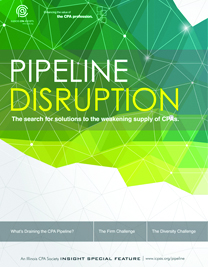Pipeline Disruption: The Firm Challenge
There’s a war being waged in the accounting profession, and we’re the ones stoking its flames.
By Derrick Lilly | Fall 2016

An excerpt from the 2016 INSIGHT Special Feature,
"Pipeline Disruption: The search for solutions to the weakening supply of CPAs."

“The talent pipeline is one of the biggest
risks to our firm and our industry.”
John Bird, CPA, Partner, RSM US LLP
[ICPAS 2016 CPA Pipeline Survey]
The war for qualified and skilled talent is real, and we have the opportunity to be part of the problem or part of the solution.
Ask the top 25 public accounting firms in Chicago what they think of the CPA pipeline and 88 percent of them will tell you there aren’t enough CPAs to meet their wants and needs.
How do we know? We asked.
In May 2016 we wrapped up a survey of Chicago’s 25 largest public accounting firms that asked managing partners, HR leaders and other strategic decision-makers from each firm some tough questions about the state of the CPA pipeline and what they’re doing to support the CPA credential and their employees aspiring to earn it. With pipeline supply and diversity being such hot-button issues in recent years, and 40 percent of firms reporting back that they’re flat out “struggling to find candidates to meet [their] CPA talent demands,” we expected some proactive and creative efforts on their behalf aimed at filling the CPA pipeline. We won’t name names or point fingers, but, frankly speaking, we found the results to be a bit lackluster.
Every firm we spoke to—100 percent of them—reported that the CPA credential is “very desirable” or “somewhat desirable” when hiring or recruiting professional staff. No one even blinked at the question. So it comes as a surprise that each and every one of these firms isn’t doing everything it can to ensure its people have the tools they need to earn the CPA.
Twelve percent of firms offer no financial assistance for CPA exam preparation courses or testing. Another 12 percent only offer financial assistance for a prep course. Only two out of 25 firms offer financial assistance for taking the CPA exam more than once (even though the average candidate will need at least two, if not three attempts to pass some sections)—one covers expenses for two attempts, while one firm will foot the bill for “as many as it takes.” Only 52 percent of firms provide both PTO and flexible work schedules for prep courses and testing. And the most popular incentive for earning the CPA credential is—drumroll please—a one-time bonus (72 percent). Twelve percent of firms don’t even offer a reward or incentive.
This all seems a bit counterintuitive when 92 percent of firms (23 of 25) “require professional staff to earn the CPA credential in order to be promoted to certain positions in the firm.”
Over and over we hear from firms that there’s a lack of CPAs and skilled candidates in the talent pool, that attracting new talent is a challenge, that there’s so much competition for top talent, and then retaining what talent they do have is a constant battle. These survey results should help to highlight, in part, why that may be.
“One of the top reasons why working professionals say they took the CPA exam is because their employer encouraged them to. We all know that it’s a really hard test that requires endurance and encouragement to get through. If you’re not supporting your employees, they’re likely going to give up because they’re not going to see the motivation as to why they’re doing it,” says Sarah Herrmann, Illinois CPA Society member outreach manager. “We also need to keep in mind that the average age of people sitting for the CPA exam in Illinois historically averages between 30 and 31 years old. It’s pretty safe to say that a 30 or 31 year old likely has a lot of responsibilities at work, and they may be married or have children to take care of at home, so the ability to really dedicate a lot of time to studying is increasingly fleeting. And if they’re not getting the time off or financial support to do what they need to succeed, they’re not going to do it, or they’re going to go somewhere where they’ll get it.”
“At the end of the day, public accounting firms, too, have to look at themselves. Are we putting our money (literally not proverbially) where our mouth is? If we’re serious about getting more accounting majors and young professionals to become CPAs, we need to provide the financial and environmental support to complete the process,” says Todd M. Shapiro, Illinois CPA Society president and CEO. “This is where you can be part of the problem or the solution. This is time and money we can’t afford not to invest.”
Think about it. Are your resources and employee perks and benefits really in line with what your people or prospective recruits need? We hear about firms trying to woo the next generation of talent by moving towards casual work environments, jeans every day, remote work arrangements, unlimited time off, and more. But are those offerings going to help advance their careers? Are those offerings going to help advance your firm or help develop and retain the talent needed to sustain it?
“Make sure you’re talking about the importance of the CPA throughout your entire recruiting and retention process, and think about which resources your firm and people really need,” Herrmann suggests. “Are the resources you’re offering matching those needs? Do your aspiring CPAs need more time off, financial assistance, or a buddy within the firm to keep them engaged and motivated to advance in the firm? At the very least, paying for the two or even three full attempts needed to pass the CPA exam is an easy thing to do. That $1K, $2K or even $3K investment in an employee is minimal for a firm, but it could be life-changing for that employee, and it instills loyalty in them when they know that your support is there and that there’s a future for them with the firm.”
As the results show, nearly all firms require professional staff to have the CPA credential before they can advance to a manager role or higher in the audit and tax service lines. Unfortunately, according to many survey responders, there’s a tightening bottleneck here because a growing number of staff either don’t have the CPA or aren’t pursuing it in lieu of advisory careers.
“If accounting graduates and young professionals don’t make the jump to become CPAs, there’s a good chance that they’ll end up not working in the profession altogether,” Herrmann warns. “What’s more is that there are so many other credentials to consider now that lead to other careers: CFA, CIA, MBA and more. Public accounting firms need to be vocal about their desire and demand for CPAs even if advisory and consulting services are driving their growth.”
So we’d like to offer a friendly challenge to not just the largest firms and companies, but all firms and companies across our state to simply do all they can to truly support the future of the CPA credential and those aspiring to earn it. Don’t worry; the Society will be here right alongside of you doing what it can to mend, expand and diversify the CPA pipeline. After all, as Herrmann kindly points out, “The onus is truly on all of us.”
the CPA credential...
“opens up doors and opportunities.”
Keith Schomig
HR Coordinator, Legacy Professionals LLP
“is a pedestal of hard work,
knowledge and effort.”
Robert J. Hannigan, CPA
Managing Partner, Bansley & Kiener LLP
“is absolutely necessary as a
minimum to advance to the
manager rank in the audit and
tax service lines.”
Jackie Rosenfeldt, CPA
Partner, Grant Thornton LLP
“is imperative for our firm.”
Janel O’Connor, SPHR, SHRM-SCP
Director of Human Capital, Sikich LLP
[ICPAS 2016 CPA Pipeline Survey]